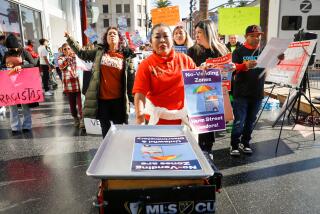Judge Delays Restrictions on Cyber Cafes
Orange County’s toughest cyber cafe ordinance won’t take effect today as planned, because of a temporary restraining order by a judge who expressed concerns about free speech and potential irreparable financial damage to cafe owners.
Five Garden Grove Internet cafe owners had sought the order, arguing that they were being unfairly blamed for gang-related crimes in the city and that they would be bankrupted by the rules, which would limit hours and require on-site security.
“We’re really happy,” said Mike Glover, 18, manager of G.G. Cybertown on Valley View Street.
“I live right around the block ... and this is a really good neighborhood.”
The rules would require minors to leave by 8 p.m. and the businesses to close at 10 p.m. Sundays through Thursdays, allowing them to stay open until midnight on Fridays and Saturdays.
Security guards and logs of customers would be required, and “boisterous conduct” banned.
“Right now, we’re open until midnight [every night]. Those extra two hours are when everybody comes,” Glover said.
Superior Court Judge Dennis S. Choate issued the stay Wednesday.
He asked both sides to try to reach a compromise before returning to court Aug. 29.
City officials said they would be happy to tweak their ordinance but have no intention of backing down completely.
“I don’t think we can continue to have murders,” Garden Grove Mayor Bruce Broadwater said.
“If we need to fine-tune it, fine, but we need an ordinance.”
There were two homicides and numerous assaults in the last year that city officials contend were connected to the cafes.
On June 8, 14-year-old Edward Fernandez was followed from a cyber cafe and shot to death.
In December, a 20-year-old was stabbed to death after leaving another.
The ordinance was enacted unanimously by the council July 9.
Greg Marcot of Kring & Chung, an attorney for the cafe owners, said, “Our clients share the same concerns about crime. But the problem is more to do with gangs than cyber cafes.”
Marcot said his clients would be open to discussing stricter rules--at cafes where there had been problems, for instance--as opposed to applying blanket rules to all of them.
The mayor and council will discuss the case in closed session Tuesday. The business owners and their attorneys met with Broadwater on Monday to try to discuss changes, then served him with notice of their intent to sue and to request the temporary stay.
Broadwater said that he wasn’t surprised and had expected legal action sooner. He said the ordinance allows cafe owners to seek conditional-use permits that would exempt them from certain provisions. He said he wondered why none of the city’s 23 cyber cafe permit holders had applied.
Marcot said he understood from his clients that seeking the conditional permits is a lengthy, potentially costly process. He added that his clients are small-business people who have put their life savings into the cafes.
“If they’re forced to incur these fees, they’ll be out of business in a fairly short period of time,” he said. “All we want is to have an open discourse about some of the problems with the ordinance.”
At least four other Orange County cities are considering implementing tougher regulations on Internet cafes, and several other cities around the state have limited hours at such businesses. The outcome of the Garden Grove case could affect some of those rules.
More to Read
Sign up for Essential California
The most important California stories and recommendations in your inbox every morning.
You may occasionally receive promotional content from the Los Angeles Times.










